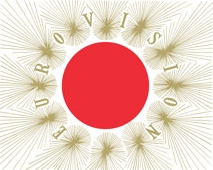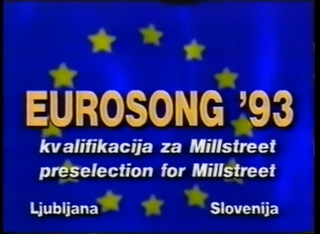
The European Broadcasting Union is an alliance of public service media organisations whose countries are within the European Broadcasting Area or who are members of the Council of Europe. As of 2024, it is made up of 113 member organisations from 56 countries, and 31 associate members from a further 20 countries. It was established in 1950, and has its administrative headquarters in Geneva.

The Eurovision Song Contest 1969 was the 14th edition of the annual Eurovision Song Contest. It took place in Madrid, Spain, following the country's victory at the 1968 contest with the song "La La La" by Massiel. Organised by the European Broadcasting Union (EBU) and host broadcaster Televisión Española (TVE), the contest was held at the Teatro Real on 29 March 1969 and was hosted by Spanish television presenter and actress Laurita Valenzuela.

The Eurovision Song Contest 1968 was the 13th edition of the annual Eurovision Song Contest. It took place in London, United Kingdom, following the country's first victory at the 1967 contest with the song "Puppet on a String" by Sandie Shaw. Despite having won for the first time the year before, it was actually the third time that the United Kingdom had hosted the competition, having previously done so in 1960 and 1963, both of which also took place in London. Organised by the European Broadcasting Union (EBU) and host broadcaster British Broadcasting Corporation (BBC), the contest was held at Royal Albert Hall on 6 April 1968, and was hosted by Katie Boyle for the third time. It was notably also the first time that the contest was broadcast in colour.

The Eurovision Song Contest 1966 was the 11th edition of the annual Eurovision Song Contest. It took place in Luxembourg City, Luxembourg, following the country's victory at the 1965 contest with the song "Poupée de cire, poupée de son" by France Gall. Organised by the European Broadcasting Union (EBU) and host broadcaster Compagnie Luxembourgeoise de Télédiffusion (CLT), the contest was held at the Villa Louvigny on 5 March 1966 and was hosted by Luxembourgish television presenter Josiane Chen.

The Eurovision Song Contest 1967 was the 12th edition of the annual Eurovision Song Contest. It took place in Vienna, Austria, following the country's victory at the 1966 contest with the song "Merci, Chérie" by Udo Jürgens. Organised by the European Broadcasting Union (EBU) and host broadcaster Österreichischer Rundfunk (ORF), the contest was held at the Großer Festsaal der Wiener Hofburg on 8 April 1967, becoming the first contest held in the month of April, and was hosted by Austrian actress Erica Vaal.

The Eurovision Song Contest 1971 was the 16th edition of the annual Eurovision Song Contest. It took place in Dublin, Ireland, following the country's victory at the 1970 contest with the song "All Kinds of Everything" by Dana. Organised by the European Broadcasting Union (EBU) and host broadcaster Radio Telefís Éireann (RTÉ), the contest was held at the Gaiety Theatre on 3 April 1971, and was hosted by Irish television presenter Bernadette Ní Ghallchóir.

The Eurovision Song Contest 1994 was the 39th edition of the Eurovision Song Contest, held on 30 April 1994 at the Point Theatre in Dublin, Ireland. Organised by the European Broadcasting Union (EBU) and host broadcaster Radio Telefís Éireann (RTÉ), and presented by Cynthia Ní Mhurchú and Gerry Ryan, the contest was held in Ireland following the country's victory at the 1993 contest with the song "In Your Eyes" by Niamh Kavanagh. It was the first time that any country had hosted two successive editions of the contest, following the previous year's contest held in Millstreet.

The Eurovision Song Contest 1982 was the 27th edition of the annual Eurovision Song Contest. It took place in Harrogate, United Kingdom, following the country's victory at the 1981 contest with the song "Making Your Mind Up" by Bucks Fizz. Organised by the European Broadcasting Union (EBU) and host broadcaster British Broadcasting Corporation (BBC), the contest was held at the Harrogate International Centre on 24 April 1982 and was hosted by English TV presenter and newsreader Jan Leeming.

The Eurovision Song Contest 1973 was the 18th edition of the annual Eurovision Song Contest. It took place in Luxembourg City, Luxembourg, following the country's victory at the 1972 contest with the song "Après toi" by Vicky Leandros. Organised by the European Broadcasting Union (EBU) and host broadcaster Compagnie Luxembourgeoise de Télédiffusion (CLT), the contest was held at the Grand Théâtre on 7 April 1973 and was hosted by German television presenter Helga Guitton.

The Eurovision Song Contest 1972 was the 17th edition of the annual Eurovision Song Contest. It took place in Edinburgh, United Kingdom and was organised by the European Broadcasting Union (EBU) and host broadcaster British Broadcasting Corporation (BBC), who agreed to stage the event after Monaco, who won in 1971, were unable to meet the demands of hosting the event and could not find a suitable venue. The contest was held at the Usher Hall on 25 March 1972 and was hosted by Scottish ballet dancer Moira Shearer.

The Eurovision Song Contest 2005 was the 50th edition of the Eurovision Song Contest. It took place in Kyiv, Ukraine, following the country's victory at the 2004 contest with the song "Wild Dances" by Ruslana. Organised by the European Broadcasting Union (EBU) and host broadcaster National Television Company of Ukraine (NTU), the contest was held at the Palace of Sports, and consisted of a semi-final on 19 May, and a final on 21 May 2005. The two live shows were presented by Ukrainian television presenters Maria Efrosinina and Pavlo Shylko.

Slovenia has participated in the Eurovision Song Contest 29 times since its debut in 1993, having hosted a qualification round in Ljubljana for seven countries due to the influx of new nations wishing to join the Eurovision Song Contest. Having only missed the event twice in 1994 and 2000 due to the relegation rule after a poor average score in the 1990s, Slovenia's best result is seventh position achieved on two occasions; in 1995 with "Prisluhni mi" performed by Darja Švajger and in 2001 with Nuša Derenda and "Energy". Since the introduction of the semi-finals in 2004, Slovenia has qualified for the final on eight occasions. As of 2024, Slovenia has not made it to the top ten since their seventh place finish in 2001, only making it to the thirteenth position in 2002 and 2011.

Duna TV, full name Duna Televízió — one of Hungary's public television channels. "Duna" is the Hungarian name for the Danube. Duna has been the national main channel of the public media MTVA since 15 March 2015.

The Czech Republic, presented as Czechia since 2023, has participated in the Eurovision Song Contest 12 times since making its debut in 2007. After receiving nul points in the semi-final of the 2009 contest and due to a lack of interest from the Czech public, Czech broadcaster Česká televize (ČT) decided to withdraw from the contest; the country would not participate again until 2015.

Kvalifikacija za Millstreet was a televised song contest held as a qualifying round for the Eurovision Song Contest 1993. Organised by the European Broadcasting Union (EBU) and host broadcaster Radiotelevizija Slovenija (RTVSLO), the contest was held on 3 April 1993 in Studio 1 of Televizija Slovenija in Ljubljana, Slovenia and presented by the Slovenian television presenter Tajda Lekše.

The Eurovision Young Musicians 1992 was the sixth edition of the Eurovision Young Musicians, held at Cirque Royal in Brussels, Belgium on 9 June 1992. Organised by the European Broadcasting Union (EBU) and host broadcaster Radio Télévision Belge Francophone (RTBF), musicians from eight countries participated in the televised final. Eighteen countries took part in the competition. All participants performed a classical piece of their choice accompanied by the Belgian National Orchestra, conducted by Ronald Zollman. Hungary and Poland made their début, while Greece and Italy decided not to participate.

The Junior Eurovision Song Contest 2019 was the seventeenth edition of the annual Junior Eurovision Song Contest, organised by Telewizja Polska (TVP) and the European Broadcasting Union (EBU). It was held on 24 November 2019, at the Gliwice Arena in Gliwice, Poland, following the country's victory at the 2018 contest in Minsk, Belarus, with the song "Anyone I Want to Be", performed by Roksana Węgiel. It was the first time Poland had hosted the contest, as well as the first Eurovision event to be held in the country since the Eurovision Young Dancers 2013.
Slovenia originally planned to participate in the Eurovision Song Contest 2020 with the song "Voda" written by Ana Soklič and Bojan Simončič. The song was performed by Ana Soklič. Slovenian broadcaster Radiotelevizija Slovenija organised the national final EMA in order to select the Slovenian entry for the 2020 contest in Rotterdam, Netherlands. 18 entries competed in the first stage of the national final, EMA FREŠ 2020, from which two entries qualified to compete in EMA 2020 following a two-month-long competition. Twelve entries competed in EMA 2020 where the winner was selected over two rounds of voting. In the first round, the top two entries were selected by a three-member jury panel. In the second round, "Voda" performed by Ana Soklič was selected as the winner entirely by a public vote.























